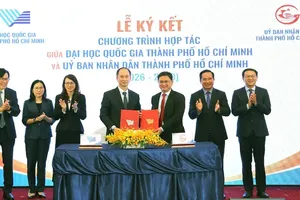
Present tuition fees are not only many times higher than those of non-autonomous schools, but also between training systems, especially high quality training programs, tuition is double that of the public system. Not only that, learners are always in a state of anxiety as tuition fees continue to escalate when this year is 10-30 percent higher than the previous year.
Tuition costs hundreds of millions of Vietnamese dong a year
Ho Chi Minh City-based University of Law has tuition fees that are considered the highest among schools specializing in law training. According to the school’s tuition plan, this year's tuition for the school's majors in the mass program ranges from VND 39.75 million (US$1,592) to VND54.93 million a year. As for the majors including Law, Business Administration in the high quality program, the tuition fees are VND70.5 million a year for Business Administration – Law, VND94.34 million a year for Administrative law and VND199.7 million a year for Law major taught in English. Worse, the school announced next year’s tuition fees will continue to increase ranging from VND44.75 million to VND219.7 million annually.
Meanwhile, it is also a school specializing in law training, but the tuition fee of the University of Law under Hanoi National University for the mass program is currently from VND27.03 million to VND35.442 million a year and high quality training program at VND 31.8 million a year. However, the school revealed from now until the 2026-2027 school year, tuition fees will continue to increase and range from VND33,473 million to VND39.8 million a year (depending on the training system).
With the group of schools that health majors, current tuition fees of Ho Chi Minh City University of Medicine and Pharmacy, Pham Ngoc Thach University of Medicine, Hanoi Medical University, and Faculty of Medicine under National University of Ho Chi Minh City have also increased quite high, 2-3 times higher than the tuition fee compared to when they are not allowed to be autonomous facilities.
For instance, Hanoi Medical University has tuition of the 2023-2024 school year from VND20.9 million to VND55.2 million yearly. Specifically, the Medicine and Traditional Medicine majors have the highest tuition fees at VND 55.2 million a year. Students of faculties such as Ophthalmic Refraction, Medical Laboratory Technology, Rehabilitation Technology, and Advanced Nursing program pay a tuition fee of VND41.8 million a year.
This tuition is 3.5 times higher than that in previous years when the school was not yet autonomous. Meanwhile, tuition fees at Ho Chi Minh City University of Medicine and Pharmacy currently range from VND41.8 million to VND77 million a year. In the 2022-2023 school year, tuition fees range from VND37 million to VND70 million a year.
Currently, when the government encourages schools to become self-financing institutions, more and more universities are building projects to seek autonomy. Therefore, tuition fees in public universities will continue to escalate with no end in sight.
Revenue thousands of billions of Vietnamese dong
According to the Ministry of Education and Training’s recent statistics, many autonomous public universities currently have a revenue of thousands of billions of Vietnamese dong, not less than to non-public universities. Specifically, Hanoi-based National Economics University's revenue in 2022 reached VND1,061 billion while Ho Chi Minh City-located University of Economics achieved VND1,443.4 billion, Hanoi University of Science and Technology VND1,067 billion, Ton Duc Thang University VND1,067 billion and Can Tho University VND1,119.7 billion.
In the top 10 universities participating in the survey conducted by the Ministry of Education and Training with the highest total revenue, five universities piloted autonomy according to the Government’s Resolution 77 on piloting innovation in operating mechanisms for public higher education institutions in the period 2014-2017. Hanoi University of Science and Technology, Ho Chi Minh City University of Economics, National Economics University, Ho Chi Minh City University of Industry, Ho Chi Minh City University of Technical Education and Polytechnic University (National University of Ho Chi Minh City) were allowed to be autonomous from 2021.
The survey carried out by the Ministry of Education and Training also pointed out that among the 30 schools with the highest total revenue, 14/23 schools are autonomous facilities according to the Resolution 77.
After nearly 10 years of implementing autonomy, many schools have had a revenue of thousands of billions of Vietnamese dong. For example, Ho Chi Minh City University of Industry reported total revenue of VND843 billion in the school year 2022-2023, of which VND740 billion from tuition fees accounting for more than 87.7 percent, VND14 billion from the budget accounting for more than 16 percent, VND4 billion from research and technology transfer making up 0.47 percent, and VND84 billion from other legal sources achieving more than 9.9 percent.
Similarly, Ho Chi Minh City University of Economics’s public report in October 2023 showed that this school had a total revenue of VND1,443.4 billion. Of which, tuition is VND960.9 billion, budget is VND6.4 billion, research and technology transfer is VND363.2 billion and other legal sources are VND112.9 billion. Meanwhile, Can Tho University which has been autonomous since 2020 had a revenue of VND1,119.7 billion including VND425.7 billion from the budget, VND578.2 billion from tuition fees, VND23.45 billion from scientific research and transfer and VND92.3 billion from other legal revenue sources.
An analysis of the revenue structure of autonomous schools has shown that the schools' revenue source is mainly from tuition fees, accounting for a very large proportion, ranging from 80-90 percent. This also means that the revenue generated from increasing targets, increasing tuition and learners is the financial source of autonomous public schools.
Citing evidence of the increase in tuition fees, Deputy Do Chi Nghia at the 15th National Assembly said that the Decree 81/2021/ND-CP regulates the mechanism for collecting and managing tuition for educational institutions in the national education system, schools can decide their own tuition fees if their training programs are audited.
Since then, schools have been racing to implement accreditation to increase tuition fees. In fact, some schools have increased tuition very high, some schools do not open normal majors but open high-quality majors.
























